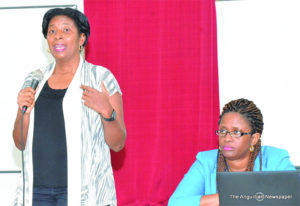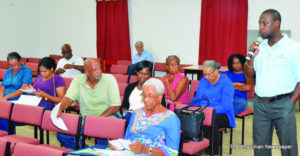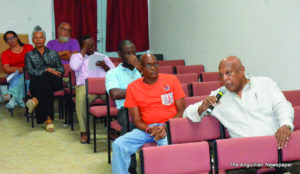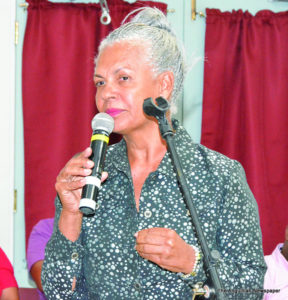



Anguilla is in the initial stage of changing its oldest Constitution in the British Overseas Territories. On Monday evening, October 29, the Ministry of Home Affairs held a public consultation on the Revised Draft of The Anguilla Constitution (Amendment) Order 2018 received from the Foreign and Commonwealth Office in London and dated October 22, 2018. Though not attended by a capacity crowd at the Teachers’ Resource Centre, it was a very informative and participatory meeting with explanations by the Minister of Home Affairs, Mrs. Cora Richardson-Hodge, and her Permanent Secretary, Mrs. Chanelle Petty Barrett, both of whom also answered questions from various persons.
Mrs. Petty Barrett observed that in May 2017 the Executive Council received two reports from the Constitutional and Electoral Reform Committee with several recommendations to the Government of Anguilla, on behalf of the people of the island, after much consultation in relation to what amendments should be proposed to the overall constitutional reform. “We are at the first stage of the reform process,” she added. “In relation to short term reform, there is another stage to come in relation to a comprehensive overall reform, but we are going to be focusing this evening on the initial stage.”
Minister Cora Richardson Hodge gave an overview of the constitutional and electoral reform process undertaken over the past years by successive Governments of Anguilla but which were unable to complete the process. She was grateful that after two years of hard work the recent Constitutional and Electoral Reform Committee (headed by Mr. Don Mitchell) had submitted an updated Draft Constitution, as well as a Draft Elections Bill, to the Government following consultations with the people of Anguilla.
“I am quite satisfied that the Committee did the work they had to do to their best ability and they presented to the Government a Draft Constitution,” the Minister continued. “Because of the timeframe, and when we saw what was happening in terms of the Brexit situation, we realized that moving forward on a wholesale Constitution…was not possible within the time that we had. Moreover, the general feeling from the public was that they wanted to see greater representation in the House of Assembly, and so we wanted to move towards more representation by way of at large voting. And we wanted to make sure that that would be covered in any amended Constitution.”
The Minister pointed out that two months ago the UK Government created a year-long Committee to look at the status of the Overseas Territories and their relationship with the UK, and that Anguilla had found itself in the midst of that initiative. She explained that it was possible that after that review a number of the territories might have to update their constitutions. As a result, Anguilla did not want to rush though its Constitution only to find itself again behind the other territories after the Brexit situation.
“We thought that in the interest of time we would deal with the key issues that impact the people of Anguilla who have been concerned about them, over the years, and wanted amendments to be made to their Constitution,” she went on. “Because of that, we decided to amend the Constitution in a two-stage process. The Government of Anguilla adopted the Draft Constitution that had been prepared by the Constitutional Committee, but we wanted to do a two-stage process where we would deal with the key issues that persons wanted to see for the 2020 general election – at this stage – and then afterwards deal with the wholesale amendments.”
The Minister of Home Affairs related how there had been an exchange of letters between Chief Minister Mr. Victor Banks and Lord Ahmad about amendments to the Constitution; and the eventual agreement between the Anguilla and the UK Governments, leading to the present Revised Order in Council.
The Permanent Secretary, Mrs. Petty Barrett, gave a detailed explanation of the agreed amendments to the Constitution as provided by the Order in Council. Among other matters, the Order “changes the title of Chief Minister to Premier, and introduces a limit of two consecutive terms for the Premier. It substitutes the term Anguillian for a person who belongs to Anguilla, and revises the categories of people who qualify as Anguillians. It also makes some changes to the qualifications for elected membership of the House of Assembly and the qualifications of voters, and enables the establishment by legislation of an island-wide electoral district in addition to the single-member electoral districts in which Anguilla is divided.”
There were a series of questions on belongership of children and grandchildren raised by Mr. Maxie Carty who spoke in comparison to the provisions of the America system of citizenship where someone born in a US territory is automatically a US citizen. He was supported in his arguments by Mrs. Ursil Brooks-Webster. Chief Minister Banks explained that such matters were outside the purview of the Anguilla Government and were subject to the British Nationality Act to which all UK Territories had to comply.
Mr. Jerome Roberts, a candidate of the Anguilla United Movement, was not in favour of the at large voting. “We are in dire straits as a country financially at this point in time,” he stated, addressing the Minister of Home Affairs. “This at large situation is going to require a period for our people to understand what is happening. It will come at a cost to the people of Anguilla … I would suggest that if you are going to move forward in this two-phase approach to which you alluded that, with reference to the at large situation, you should put that in your second phase.”
Chief Minister Banks replied in part: “I am not so sure whether the member understands the process of putting in place the at large seats, and why it is critical that we do it now. If you are really serious about expanding the House, it means that if we don’t expand it now, the next time that we will have the opportunity to expand it will be in 2025. It means seven years – or six and-a-half-years – before we move to the at large seats. That is why we think it is important to establish the at large seats, or the expansion of the House, now in the first place so that we can give voters in the next election the opportunity to go through the education process just like people who reside in the other jurisdictions of the Overseas Territories – where they have at large or island-wide seats…
“I understand what he [Mr. Roberts] says about [the public] purse and all that, but adjustments can be made one way or the other to deal with that issue. But the issue of Anguilla expanding its legislature by adding the at large seats, and also adding constituencies at some point, is critical to dealing with the concerns we have about the ‘dictatorship’ of Executive Council, for lack of a better word, and the expansion of ministerial leadership in the governance process. It is important that we do it now.”
Mr. Roberts argued repeatedly: “It is absolutely no urgency now…We can wait until 2025 and get it done correctly.”
Minister Cora Richardson-Hodge, noting how this would affect the process going forward, commented: “There must be a reason why Anguilla has the oldest Constitution of every British Overseas Territory from 1982 – and we are now in 2018. And we are now talking about there is no rush – let us wait until 2025. It bothers my mind because it means then that, as a country, we could never move forward …” She added that the people of Anguilla had been asking for at large voting over the years so that they can have greater representation and democracy in the House of Assembly.
Opposition Leader, Ms. Palmavon Webster, said her main concern had to do with governance. She took the opportunity to complain that “Anguilla is probably the only territory where the Office of the Leader of the Opposition is not a substantive institution as it is everywhere else; and that none of the Anguilla Governments had provided for that office to be a substantive office.”
She was of the view that there were many acceptable changes that could immediately strengthen democracy in Anguilla and that rather than making the Government bigger [by adding the four at large seats] the issue of governance was what the people of Anguilla had been concerned about.
Mr. David Carty, a former Chairman of the Constitutional and Electoral Reform Commission, gave some very useful views and comments on the Revised Order in Council and the Constitutional Amendments.
Several other questions and matters were raised and answered as the highly informative consultation came to a close.







